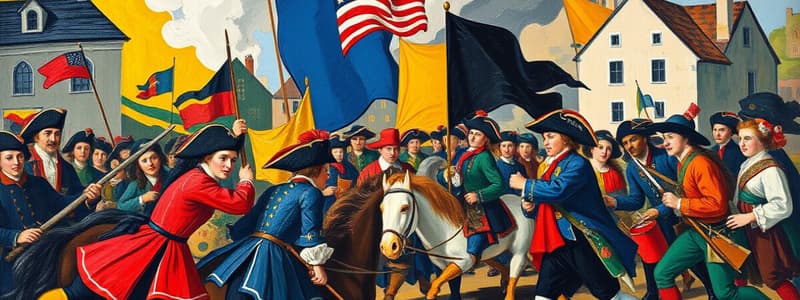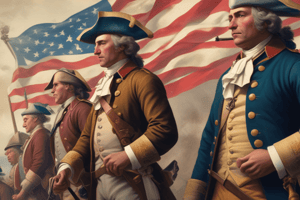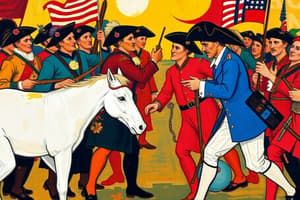Podcast
Questions and Answers
Which of these groups gained territory in North America as a result of the French and Indian War?
Which of these groups gained territory in North America as a result of the French and Indian War?
- Great Britain (correct)
- Spain
- France
- American Indians
Before 1760, which statement best describes the colonies?
Before 1760, which statement best describes the colonies?
The colonies had assemblies that passed laws.
Which of these groups benefited from the Proclamation of 1763?
Which of these groups benefited from the Proclamation of 1763?
- Colonists
- American Indians (correct)
- French settlers
- Great Britain
Which of these was a result of the French and Indian War?
Which of these was a result of the French and Indian War?
Which group formed the Sons of Liberty?
Which group formed the Sons of Liberty?
What did the colonists resent most about the Stamp Act?
What did the colonists resent most about the Stamp Act?
The name Boston Massacre was given to the events of March 5, 1770, in order to
The name Boston Massacre was given to the events of March 5, 1770, in order to
Cause and effect of the Townshend Acts:
Cause and effect of the Townshend Acts:
What was Great Britain's response to the Boston Tea Party?
What was Great Britain's response to the Boston Tea Party?
In which way did Great Britain increase its control of the colonies?
In which way did Great Britain increase its control of the colonies?
What was a goal of the First Continental Congress?
What was a goal of the First Continental Congress?
Which of these best describes how the colonists viewed themselves in 1774?
Which of these best describes how the colonists viewed themselves in 1774?
How did Parliament respond to the colonists' protests against the Stamp Act?
How did Parliament respond to the colonists' protests against the Stamp Act?
How did many of the Loyalists view the Patriots?
How did many of the Loyalists view the Patriots?
Which of these did the colonists consider an act of tyranny?
Which of these did the colonists consider an act of tyranny?
What became evident when the colonists and British troops clashed at Lexington and Concord?
What became evident when the colonists and British troops clashed at Lexington and Concord?
Paul Revere engravings refer to
Paul Revere engravings refer to
Flashcards are hidden until you start studying
Study Notes
Territorial Gains
- Great Britain gained significant territory in North America after the French and Indian War.
Colonial Assemblies Pre-1760
- Prior to 1760, American colonies had their own assemblies that created and passed laws.
Impact of the Proclamation of 1763
- The Proclamation of 1763 primarily benefited American Indians by limiting colonial expansion into their territories.
British War Debt
- The conclusion of the French and Indian War left the British government with a substantial war debt.
Sons of Liberty
- The Sons of Liberty were formed by Patriots to resist British policies and taxes.
Stamp Act Resentment
- Colonists were particularly resentful of the Stamp Act because they had no representation in Parliament to vote on the tax.
Boston Massacre's Intent
- The term "Boston Massacre," coined after the events of March 5, 1770, aimed to incite anti-British sentiment among the colonists.
Townshend Acts and Boycotts
- The Townshend Acts led to widespread boycotts against British goods as a form of protest.
Response to the Boston Tea Party
- In retaliation for the Boston Tea Party, Great Britain enacted the Intolerable Acts to assert control over the colonies.
Increased Taxation Control
- Great Britain's response to colonial dissent included imposing taxes on the colonists, increasing their control over colonial affairs.
First Continental Congress Goals
- The First Continental Congress aimed to address conflicts with Great Britain and seek possible resolutions.
Colonial Identity in 1774
- By 1774, colonists viewed themselves primarily as citizens of their respective colonies rather than a unified entity.
Parliament's Reaction to Protests
- In response to widespread protests against the Stamp Act, Parliament eventually repealed the law.
Loyalists' Perception of Patriots
- Many Loyalists regarded the Patriots as ungrateful rebels against the authority of the British crown.
Act of Tyranny
- The Proclamation of 1763 was perceived by colonists as an act of tyranny against their rights.
Clashes at Lexington and Concord
- The conflicts at Lexington and Concord demonstrated the colonists' readiness to fight for self-governance and independence.
Paul Revere's Engravings
- Engravings created by Paul Revere serve as a historical reference to the Boston Massacre, highlighting its significance in colonial resistance.
Studying That Suits You
Use AI to generate personalized quizzes and flashcards to suit your learning preferences.




